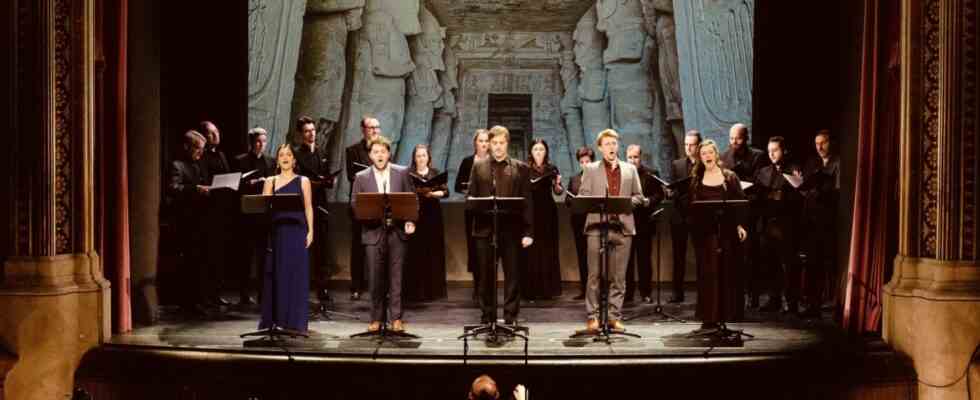In the end, “The Philosopher’s Stone or the Magic Island” takes a quantum leap in the beautiful Parktheater Göggingen from 1886 with its airy cast-iron construction. Premiered in 1790 in the Theater an der Wieden in Vienna and lost until 1996, the Singspiel, the manuscript of which is kept in the Hamburg City and State Library, is now being performed in Augsburg for the second time after 2001, following performances in various cities.
But while the joint work based on motifs by Christoph Martin Wieland to a libretto by Emanuel Schikaneder, known as the first Papageno and lyricist of “Magic Flute”, contains music by Johann Baptist Henneberg, Benedikt Schack and Franz Xaver Gerl up to the second finale, the end comes from Wolfgang Amade Mozart!
A year before the premiere of “Magic Flute” the protagonists gather here
A year before the premiere of “Magic Flute”, also in the Theater an der Wieden, the later protagonists are already gathering here: Henneberg was their conductor, Schack the first Tamino and here embodies Astromonte, the good spirit king; Gerl sang the first Sarastro and is here Eutifronte, Astromonte’s evil brother as the god of the underworld. In “The Philosopher’s Stone” they wrote the arias for themselves, so to speak.
Unlike “The Magic Flute”, this Singspiel meanders with its somewhat complicated plot about the kings of light and the night, who argue about two couples, Nadir/Nadine and Lubano/Lubanara, for long stretches despite the beautiful music. The spoken texts would have benefited from more cuts and a dialogue director. But the singing ranged from appealing to excellent: Michael Schade played the air god Astromente as a jovial squire with a loden cape and hat, the young tenor Kai Kluge successfully fought for his Nadine with a fine, lyrical tenor (with a concise, rich soprano: Leonor Amaral). Jonas Müller was able to draw on his experience as Papageno in the role of Lubano, which is very similar, and filled it with a wonderfully relaxed baritone and lots of dry wit in the dialogues. Whenever Elena Harsányi gave up her coquettish permanent smile as his rebellious wife Lubanara, her light soprano voice was all the more impressive. Bassist Martin Summer shone as Eutifronte not least in the dialogues with a deep, multi-faceted voice. The quite busy choir of the administration of sound (rehearsal: Christiane Büttig) did its job better and better during the evening.
The Hofkapelle Munich has already recorded a few numbers of the Singspiel with Konstantin Krimmel on CD and is now, again under the direction of Rüdiger Lotter, the guarantee for a successful concert performance, even if some tempos could have used a little more liveliness.

